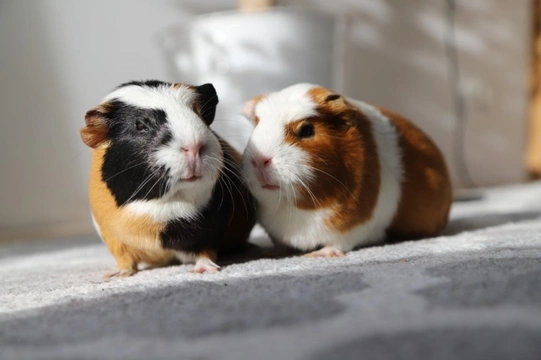
Keeping small caged pets safe and calm on Guy Fawkes night
Most pet lovers know that Guy Fawkes night or bonfire night can be very stressful for pets, but it tends to be cats and particularly, dogs that we think about as reacting badly and being more likely to run off in fear.
However, animals of all shapes and sizes tend to find Guy Fawkes night or bonfire night stressful, as you might imagine; and when it comes to animals that are highly strung, fragile or prone to stress, this can be even more acute.
Coupled with this, if your pets live outside in a hutch, they will be even more exposed to the sounds and sights that can upset them, and may be extremely frightened as a result. All of this means that bonfire night or Guy Fawkes night can be quite fraught and stressful for both pets and their owners; but if you own small, caged pets like rabbits, Guinea pigs, rats, mice, hamsters or gerbils, there are several things you can to do reduce the impact on them.
With this in mind, this article will share some tips and advice on how to keep your small pets like rabbits or hamsters safe and calm on Guy Fawkes night. Read on to learn more.
Bring outdoor pets in if possible
If your rabbits, Guinea pigs or other pets live in hutches and runs outside, the best thing you can do on the night itself (or at other times when fireworks are expected) is to bring their hutches or houses indoors. Pets that live in outdoor hutches tend to be quite hardy as a result so if you have a properly ventilated shed or garage this is a fine alternative if you can’t bring the hutches into your actual home.
Ensure that wherever you do locate them, the temperature is not a lot warmer than they are used to, and that there is sufficient ventilation. If you have nowhere you can bring your pets in to, turn their hutches against the wall (leaving a ventilation gap) to reduce the impact of bangs and flashes.
Provide extra bedding
Most small pets create nests and burrows for warmth and reassurance from the material they are provided with for bedding, and this helps to keep them calm and feeling safe.
You can help with this by providing them with plenty of bedding plus some extra when fireworks are expected so that they can insulate themselves as far as possible from the noise and fuss, and deaden the sound somewhat too.
Cover hutches and cages
Whether your pets’ cages are indoors or outdoors, covering them over and particularly, covering the fronts and any sides that your pet can see out of will also have an insulating effect and help to negate the impact of the bangs and flashes.
Try to use a dark, fairly thick fabric, but ensure that there is still enough airflow to the cage itself.
Don’t remove pets from cages when stressed
If your pets are acting erratically because they’re stressed or upset, or if you’re concerned about how they’re coping and want to check on them, you might be tempted to remove them from their cage and check them over, and give them a cuddle for reassurance. However, this is not a good approach, and might well stress your pet out even more.
Small animals are prey animals to larger creatures, and so they react to perceived threats accordingly; they find a bolthole or safe space to hide in and stay still. You will make them more afraid by removing them from this safe space, even if they are very tame and used to being handled.
Additionally, a pet that is frightened can behave erratically, and might bite you or claw at you to get away, resulting in an injury and the risk of your pet falling or being dropped.
The other thing to consider is that your pet might run off or try to find somewhere to hide when outside of their cage, which could result in small pets becoming lost in the house, or causing themselves an injury trying to get into our out of places that aren’t safe for them.
Keep an eye on food and water
Many small pets can be quite messy to own, and will sometimes get food all over their cages and spill water, and if they’re building nests and scrabbling around due to stress, this can be worse than normal!
Try to set up your pet’s food and water so that it can’t be spilled easily if your pet behaves erratically, but wait until the fireworks are over and your pet is calm once more before you open the cage to sort things out. If your pet does need more water, provide this as soon as it is safe to open the cage, but ideally, leave any non-essential clean-ups until the next day.



